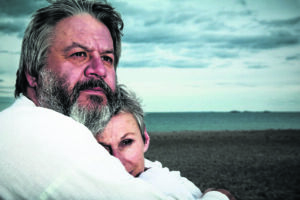Things to do
Theatre review of ‘A Tender Thing’
This article is more than 10 years old.
Anything but plain sailing, a theatre experience you’ll never forget

Andrew Jeffers and Sue Hansen-Styles (photo: pancakebeaver.com)
Why Not Theatre Company’s ‘A Tender Thing’ is the ultimate tale of unconditional love. It’s a ‘Romeo and Juliet’ for our century, presenting a dilemma so many of us will at some point in our lives be confronted with: euthanasia and its use to ease a loved one’s suffering despite the pain it will cause us.
But just because this is the subject matter of Ben Power’s modern retelling of that Shakespearean classic, in which he cleverly reworks the Bard’s verse for modern lips, don’t assume you’ll know what’s going to happen.
The very mention of that tragedy should warn you that anything can happen. After all, we know how that ended! And likewise with ‘A Tender Thing’, you’ll be on tenterhooks until the final curtain.
By the laws of the sea
It was a rainy Tuesday as I cycled to the theatre. “The play is in a boat,” I was told, which struck me as intriguing. I was definitely curious about both the content and the setting of what I was about to see.
Once inside the boat, I entered a new world. Immersing myself in the silent room, I mostly forgot what was moving beneath my feet.
Although the feeling of occasional movement – at a time when I was sitting rigid in my seat barely able to breathe – is an experience I’ll never forget!
End this pain
Remember when you were young and felt the kind of passionate love that left you unable to eat or sleep, like you had reached for the stars and won the World Series?
Romeo and Juliet are an old couple who still feel like that. But now life is threatening to prise them apart. A terrible illness is killing Juliet. And Romeo can’t bear the idea of losing her.
He wants to help her, to stop her agony, which increases as the play progresses. You feel her misery and empathise with her desire to end it once and for all.
But equally, you feel for Romeo. He doesn’t want to lose her. She is the love of his life and he wants them to stay together ‘in sickness and in health’.
We always will be together
On Tuesday I witnessed a remarkable performance by Andrew Jeffers and a heart-aching interpretation by Sue Hansen-Styles. Their story really challenges you: how far would you go to end the suffering of your loved one? And how far would you go to end your own, after losing your one and only love?
Euthanasia is likely to affect us all in the 21st century. It’s not an issue to shy away from. You owe it to yourself to take this chance to consider this dilemma whilst watching this truly engrossing play in a remarkable setting.
In the realms of fairy tales or back in ancient times, killing yourself to be with the one you love for eternity was the ultimate romantic gesture. These days, though, it might be being able to let go.
★★★★
A Tender Thing
ends June 12, performances June 8-9 at 20:00, June 10-12 at 17:00; Bådteatret, Nyhavn 16, Cph K; tickets: 40-140kr, teaterbilletter.dk










































